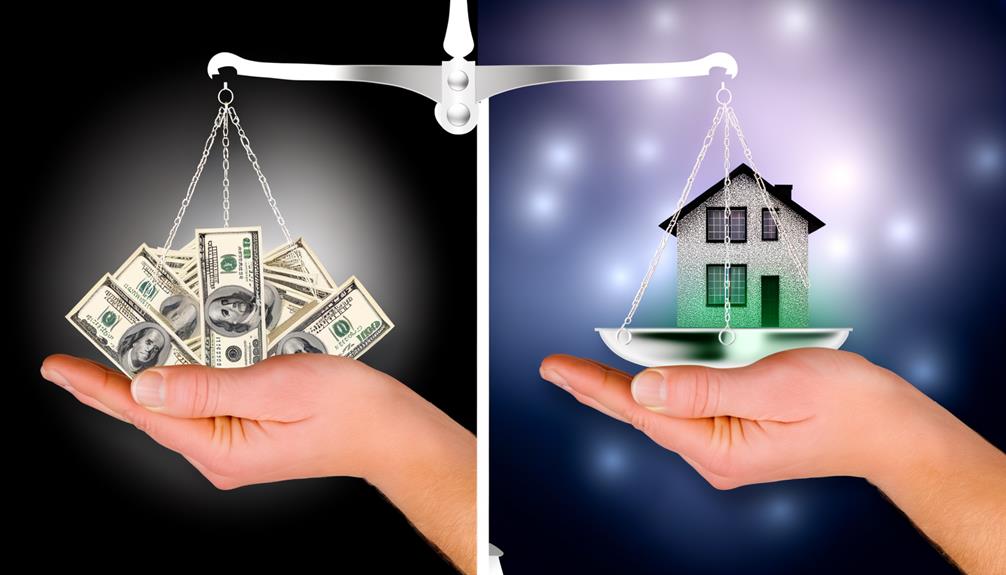While the traditional method of acquiring a property often involves the procurement of a mortgage loan, the practice of paying cash for a house has gained popularity, presenting a set of unique advantages. These include the potential for expedited transactions, the omission of monthly mortgage payments, and a certain appeal to sellers in competitive markets.
However, the benefits do not end there. The financial implications of such a decision can be far-reaching, prompting a more comprehensive exploration of this topic. Might paying cash upfront be the prudent choice for prospective homeowners? The answer may be more nuanced than it initially appears.
Key Takeaways
- Paying cash for a house increases buying success rates, expedites sales process, and reduces total homeownership costs.
- Financial benefits include substantial savings from avoiding mortgage interest and immediate equity building.
- Cash buyers gain negotiation power and preference from sellers due to quicker and secure transactions.
- Paying cash mitigates risks, but requires thorough evaluation of financial situation, property value, and potential encumbrances.
Understanding Cash Home Purchases
Delving into the realm of cash home purchases, it's important to note that this method of transaction can offer a distinct competitive edge, especially in high-stakes bidding wars, effectively increasing success rates by a staggering 97%. This significantly high percentage elucidates the potential power of a cash home purchase, particularly in markets where properties are in high demand.
A cash offer provides a competitive advantage chiefly because it eliminates the risk of loan denial, a common pitfall for many conventional home buyers. By showing a seller that the funds are readily available, a cash buyer can confidently bypass this risk, turning the transaction into a much smoother, quicker process.
Moreover, cash home purchases can save money on loan-related expenses, such as lender fees and closing costs. By circumventing these often cumbersome additional costs, a buyer can keep a larger portion of their hard-earned money. It is this combination of factors that makes purchasing a house with cash a particularly attractive proposition, offering potential homeowners not only a unique opportunity to secure a home but also a chance to save money, solidifying their financial standing.
Financial Benefits of Cash Payment
The financial benefits of cash payment for a house are manifold and significant.
Firstly, it allows homeowners to bypass mortgage interest, fostering immediate equity building, and resulting in substantial savings over time.
Secondly, cash purchases circumvent loan-related expenses such as closing costs and lender fees, thus lowering the total cost of home ownership.
No Mortgage Interest
One of the most significant financial benefits of paying cash for a house is the avoidance of mortgage interest, which can result in substantial savings over the life of a loan. This aspect of cash payment provides a solid foundation for financial well-being and prosperity.
Interest Savings: With no mortgage, there's no interest to pay. This could translate into thousands of dollars saved over time, freeing up money for other investments or financial goals.
Rate Security: Cash buyers never have to worry about interest rates rising in the future, ensuring financial stability.
Faster Equity Building: Eliminating mortgage interest means homeowners can build equity in their property faster, providing a stronger financial foothold.
In essence, paying cash for a house offers noteworthy financial advantages by sidestepping mortgage interest.
Immediate Equity Building
Bolstering your financial stability, paying cash for a house leads to immediate equity building, as the property is owned outright without the burden of a mortgage. This method eradicates the need for mortgage interest payments, saving you thousands of dollars over time and enhancing your financial security. A cash purchase offers the advantage of increasing your net worth instantly, providing peace of mind.
| Benefits of Cash Payment | Impact |
|---|---|
| Immediate Equity Building | Increases net worth and financial stability |
| No Mortgage Interest Payments | Saves thousands of dollars over time |
| Outright Ownership | Grants peace of mind and financial security |
| Reduced Overall Cost | Avoids loan-related expenses |
With these benefits, it's clear that cash payment for a house is a viable option for those seeking to build equity quickly and secure their financial future.
Lower Closing Costs
Shifting focus to closing costs, it becomes evident that cash payments for a house significantly alleviate financial strain by eliminating hefty lender-related fees and expenses.
- Lender Fees: With a cash purchase, you bypass lender fees, which are typically imposed when applying for a loan. This includes application fees and loan origination fees, which can be substantial.
- Discount Points: These are essentially prepaid interest, a cost you can sidestep entirely with a cash transaction.
- Lender's Title Insurance Policy Costs: Cash buyers are not required to purchase a lender's title insurance policy, leading to further savings.
Closing Process: Cash Vs Mortgage
Why is the closing process faster with cash purchases compared to mortgages? The closing process for cash buyers is streamlined, as it eliminates the need for extensive mortgage-related documentation. This leads to a quicker closing, potentially in as little as a week or two, compared to a mortgage process that can take 30 to 45 days or longer.
Cash buyers provide a quicker closing process, reducing the risk of financing falling through. Additionally, transactions are often smoother, as sellers may be more willing to negotiate with cash buyers. This faster and more straightforward process benefits both buyers and sellers, ultimately fostering a sense of belonging and community in the real estate market.
The table below illustrates the main differences between cash and mortgage transactions.
| Aspect | Cash Purchase | Mortgage Purchase |
|---|---|---|
| Closing Time | 1-2 weeks | 30-45 days |
| Documentation Required | Minimal | Extensive |
| Risk of Financing Falling | Low | High |
| Seller Negotiation | More likely | Less likely |
| Transaction Speed | Faster | Slower |
The Impact on Seller Preferences

The preference sellers often exhibit towards cash buyers is primarily influenced by three factors.
Firstly, the appeal of a quick transaction, given that cash-only purchases can typically be closed promptly, reducing the risk of the sale falling apart.
Secondly, the ability to bypass financing hurdles, as cash offers eliminate the need for buyer loan approval, significantly reducing transaction uncertainties and instilling confidence in sellers.
Quick Transaction Appeal
In the realm of real estate transactions, cash buyers often present a compelling appeal to sellers due to the potential for expedited transactions and increased assurances of sale completion. This quick transaction appeal is especially advantageous in competitive markets, where a cash offer can lead to a faster closing.
Three key attributes make cash purchases particularly attractive:
- Cash offers increase the chances of a successful bid by 97%, a statistic that underscores their importance in hot housing markets.
- Cash transactions facilitate shorter escrow periods, which significantly expedite the sales process.
- In luxury markets, buying with cash enhances the likelihood of success by over 400%, emphasizing the appeal for sellers.
Hence, paying cash for a house does not only benefit the buyer, but it also favors the seller by offering a swift and assured transaction.
Bypassing Financing Hurdles
Navigating through financing hurdles becomes a non-issue with cash transactions, a factor that significantly sways seller preferences towards cash buyers in competitive markets. Indeed, cash offers increase the chances of winning a bidding war by a staggering 97%, demonstrating the undeniable appeal of cash transactions.
This preference stems from the ability of cash buyers to eliminate financing risk, ensuring a smoother, more reliable transaction process. Furthermore, cash purchases typically result in a faster closing process, shorter escrow periods, and fewer contingencies, all of which serve to strengthen the allure of cash offers.
In luxury markets, this appeal is even more prominent, with cash purchases increasing the likelihood of success by over 400%. Overall, cash transactions signal strength, reliability, and a competitive edge in hot housing markets.
Strengthening Negotiation Power
Building on the reliability and efficiency inherent in cash transactions, cash buyers often find themselves in a position of strengthened negotiation power, particularly appealing to sellers in fiercely competitive markets. These advantages make cash buyers significantly more attractive to sellers.
- Cash buyers are likely to win in bidding wars, as they provide a quicker, more secure transaction, thereby increasing the chances of a successful bid by 97%.
- Sellers are more inclined to negotiate with cash buyers, given the certainty and speed of closing they offer, eliminating the risk of loan fall-through.
- The absence of lender involvement streamlines the transaction process, making it more comfortable for sellers and further enhancing the negotiation power of cash buyers.
Potential Cons of Cash Payment

While paying cash for a house can offer distinct advantages, it is crucial to consider several potential drawbacks, such as the risk of tying up a significant amount of money in a single illiquid asset, which can limit financial flexibility. This is one of the significant cons of paying cash for a property. Cash payments can also lead to missed investment opportunities and loss of diversification as all savings could be tied to the house, reducing the appeal of this approach.
| Disadvantages | Implications | Emotional Response |
|---|---|---|
| Illiquid Asset | Limited Financial Flexibility | Fear of Financial Tightness |
| Missed Investment Opportunities | Restricted Financial Growth | Anxiety about Missed Opportunities |
| Missed Tax Benefits | Reduced Tax Savings | Concern over Lost Savings |
The absence of mortgage interest deduction on tax returns, a missed tax benefit, further exacerbates the potential cons of a cash payment. Lastly, using your entire savings for the purchase may limit your access to emergency funds, possibly leading to financial instability. It is essential to consider these drawbacks and evaluate your financial situation before deciding to pay cash for a house.
Evaluating Your Financial Situation
Given the potential drawbacks outlined, it becomes even more crucial to carefully assess your current financial standing before making the decision to purchase a house outright with cash. The evaluation process should take into account a comprehensive view of your financial situation, including short-term and long-term financial goals, retirement savings, and tax implications.
Three crucial aspects to consider are:
- Financial Goals: Are you on track to meet your financial objectives? Purchasing a house with cash can significantly reduce your financial flexibility for other goals.
- Retirement Savings: Do you have enough money saved for retirement? It's important to ensure you have a sufficient nest egg before considering a large cash purchase.
- Tax Implications: Are you aware of the potential tax deductions and benefits associated with home ownership?
Thoughtful consideration of these factors can help you make a decision that aligns with your financial plan. This financial prudence ensures your purchase enhances your sense of belonging without compromising your financial security. The decision should not only make sense today but also align with your financial outlook for the future.
Mitigating Risks in a Cash Purchase

In the realm of real estate transactions, mitigating risks when making a cash purchase is of paramount importance and involves a multi-faceted approach to due diligence. Conducting thorough due diligence includes title searches, appraisals, and inspections. These actions help verify the property's value and condition, ensuring a sound investment.
Professional services, such as title companies and land surveyors, are instrumental in uncovering potential issues associated with the property. They gather vital information to assess the property's market value and identify required repairs or upgrades.
Moreover, ensuring no financial encumbrances or liens exist on the property is crucial. These could affect your ownership rights when purchasing a house with cash.
The following table summarizes the key steps involved in mitigating risks:
| Risk Mitigation Techniques | Description |
|---|---|
| Title Searches | Identify potential ownership disputes or issues |
| Appraisals | Determine the market value of the property |
| Inspections | Uncover necessary repairs or structural issues |
| Professional Services | Assist in due diligence and uncover potential risks |
| Check for Liens | Ensure no financial encumbrances on the property |
This detailed, analytical approach significantly reduces the risks associated with cash purchases.
Exploring Other Investment Opportunities
Despite the reduced risks associated with cash purchases, it's crucial to recognize that this method could potentially limit other investment opportunities by tying up a substantial amount of capital in a single asset. Here's a concise analysis of three significant considerations:
- Opportunity Costs: By allocating a considerable sum to a single property, you may miss out on potentially higher returns if you diversified your investments. Different investment opportunities could generate higher returns over the long term.
- Tax Benefits: Cash buyers forfeit the chance to deduct mortgage interest from their tax returns. These tax benefits could have a noticeable impact on your annual tax bill, and losing them is a point worthy of consideration.
- Financial Flexibility: Cash purchases may limit your financial flexibility. Tying up your capital in one asset reduces liquidity, potentially creating difficulties when unforeseen expenses arise or when new investment opportunities present themselves.
In essence, the decision to pay cash for a house should be made after evaluating these factors. It's always important to maintain a balance between achieving homeownership and optimizing your financial growth potential through other investment opportunities.
The Final Verdict: Cash or Mortgage?

Weighing the pros and cons of paying cash for a house versus obtaining a mortgage requires a careful assessment of several significant factors. First, the elimination of mortgage interest payments can result in substantial long-term savings. Cash offers also fare better in a competitive market, improving success chances by an impressive 97%.
Avoiding loan-related costs such as closing fees and lender charges further reduces expenditure associated with cash purchases. Moreover, cash transactions can expedite the closing process due to shorter escrow periods and fewer contingencies.
However, the allure of cash purchases should not overshadow the potential downsides. The substantial upfront cost may deplete your savings or limit your ability to invest elsewhere. It's also important to remember that mortgages can offer tax benefits that cash purchases do not.
The peace of mind gained from owning a home outright, free from the burden of a monthly mortgage, is a compelling argument for cash purchases. Ultimately, the choice between cash and mortgage depends on an individual's financial situation, risk tolerance, and long-term goals. Proper consultation with financial advisors is critical to make an informed decision that aligns with your unique circumstances.
Frequently Asked Questions
Is It Ever a Good Idea to Pay Cash for a House?
Yes, paying cash for a house, akin to a bird in hand, offers immediate ownership, ensures cash liquidity, promotes investment diversification, and eliminates mortgage concerns, fostering a sense of financial stability and community belonging.
What Are the Disadvantages of Paying Cash for a House?
Paying cash for a house may present disadvantages including reduced financial flexibility, potential loss of investment opportunities, and difficulty covering unplanned expenses, as substantial funds are tied up in a single, non-liquid asset.
Does the IRS Know When You Buy a House Cash?
Yes, the IRS may be informed of large cash transactions, including home purchases, to ensure tax compliance and transaction transparency. While offering privacy benefits, cash purchases can also invite scrutiny to prevent activities like money laundering.
How Much Less Should You Offer on a House When Paying Cash?
Utilizing cash bargaining power can potentially lower the offer on a house by 5-10%. Market dynamics impact this figure, with seller preferences for swift transactions often favoring cash buyers despite lower bids.
Conclusion
In conclusion, the choice between cash and mortgage purchases hinges on individual financial circumstances, market conditions, and personal preferences.
Cash purchases offer substantial advantages, including streamlined closing procedures, immediate ownership, and significant financial savings. However, they also necessitate careful risk mitigation and forego potential investment opportunities.
The savvy purchaser must therefore weigh these factors judiciously, echoing the wisdom of Benjamin Franklin: 'An investment in knowledge pays the best interest.'


